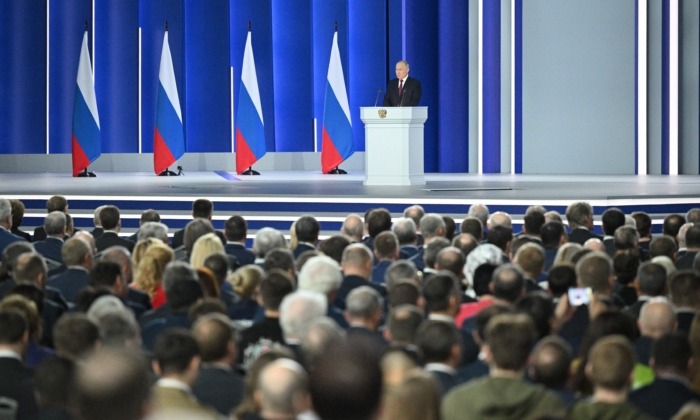
posted February 22, 2023
Russian President Vladimir Putin on Feb. 21 announced Moscow’s unilateral suspension of its participation in the New START treaty, the last remaining nuclear arms control pact with the United States.
“As of today, Russia is suspending its participation in the strategic offensive arms treaty,” Putin said in a national address, which he delivered almost one year after the launch of Russia’s invasion of Ukraine.
“We’re not withdrawing from the agreement,” he clarified. “We’re just suspending [our participation in] it.”
The New START treaty, which was first signed in 2010 and took effect the following year, aims to set limits on both countries’ sizable nuclear arsenals.
In 2021, shortly after U.S. President Joe Biden took office, the treaty was extended by a further five years.
The United States and Russia are believed to account for roughly 90 percent of the world’s existing nuclear warheads.
According to the Washington-based Center for Arms Control & Non-Proliferation, Russia’s arsenal consists of some 5,977 nuclear warheads, while the United States currently possesses about 5,550 warheads.
U.S. Secretary of State Antony Blinken described the move as “unfortunate and irresponsible.”
“We’ll be watching carefully to see what Russia actually does,” Blinken told reporters. “We’ll, of course, make sure that in any event we are postured appropriately for the security of our own country and that of our allies.”
The Brussels-based NATO alliance, for its part, said Putin’s announcement signaled the end of the existing global arms-control architecture.
“With today’s decision [by Russia] on New START, full arms control architecture has been dismantled,” NATO Secretary-General Jens Stoltenberg told reporters. “I strongly encourage Russia to reconsider its decision and respect existing agreements.”
Last month, the U.S. State Department claimed in a report to Congress that Russia was refusing to allow on-site inspections of its nuclear weapons facilities. The report also claimed that Moscow had failed to respond to the Biden administration’s requests to discuss its alleged noncompliance with the New START treaty.
“Russia is not complying with its obligation under the New START treaty to facilitate inspection activities on its territory,” the State Department said in a Jan. 31 statement.
“Russia’s refusal to facilitate inspection activities prevents the United States from exercising important rights under the treaty and threatens the viability of U.S.-Russian nuclear arms control.”
In his Feb. 21 address, Putin described Western demands that Russia open its nuclear weapons facilities to on-site inspections as “absurd.”
“The United States and NATO openly state that their strategic objective is to defeat Russia,” he said. “Yet they think they will be allowed to inspect our nuclear-weapons facilities?”
He added that while Washington demands on-site inspections of Russia’s nuclear facilities, NATO allies were actively helping Ukraine strike Russia’s strategic airbases. Airbases located deep inside Russian territory came under attack in December 2022, prompting concern about possible retaliation by Moscow.
On Dec. 5, two airbases in central Russia were attacked by drones of unknown origin, damaging two aircraft. One of the bases hosts long-range strategic bombers capable of carrying nuclear payloads.
While Kyiv didn’t claim responsibility for the attacks, they were widely hailed by Ukrainian military officials.
In his address, Putin also drew attention to the substantial nuclear arsenals possessed by the UK and France, both of which are core NATO members. While these arsenals constitute part of what Putin called NATO’s “combined strike potential,” neither is subject to the limitations laid out in the New START treaty.
According to Putin, British and French nuclear weapons are “also aimed at us; they are aimed at Russia.”
Putin’s address in Moscow coincided with a visit by Biden to Ukraine and neighboring Poland.
On Feb. 20, the U.S. president paid an hours-long visit to Kyiv, during which he reiterated Washington’s steadfast support for the Ukrainian war effort. He also pledged an additional $500 million in aid to Kyiv.
Since Biden took office in January 2021, the United States has provided Ukraine with more than $25 billion in security assistance.
From Kyiv, Biden traveled to the Polish capital Warsaw, where he delivered a speech on Feb. 21, addressing the passage of one year since Moscow’s invasion of Ukraine.
Russia invaded Ukraine on Feb. 24, 2022. Since then, Russian forces have captured broad swathes of territory in the Russian-speaking Donbas region and along the country’s southern Black Sea coast.
Moscow announced the unilateral annexation of the Russian-controlled Donetsk, Luhansk, Zaporizhzhia, and Kherson regions after overseeing widely condemned referendums in October 2022.
Kyiv and its Western allies reject the legitimacy of the move, while Ukrainian military officials have vowed to recover all lost territory by force of arms.
Moscow says its invasion and subsequent annexations were intended to protect Russian speakers in the Donbas region (comprised of Donetsk and Luhansk) from alleged abuses by the Kyiv government.
Kyiv, for its part, denies the claim, saying the moves by Russia amount to an illegal land grab.
Despite successful Ukrainian counter-offensives last fall, Russian forces have since appeared to regain the initiative. In recent weeks, they have captured key positions in the Donetsk region, with the help of local allies and the Wagner Group, a Kremlin-directed paramilitary organization.
Speculation has mounted in recent weeks that the one-year anniversary of the conflict could coincide with fresh Russian offensives along the roughly 600-mile-long front line.
Credit: Agency reports from TheEpochTimes.

